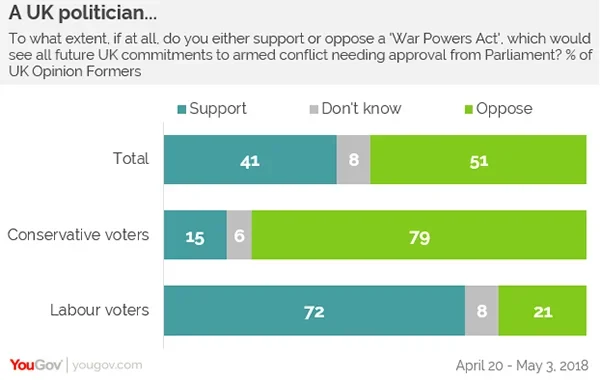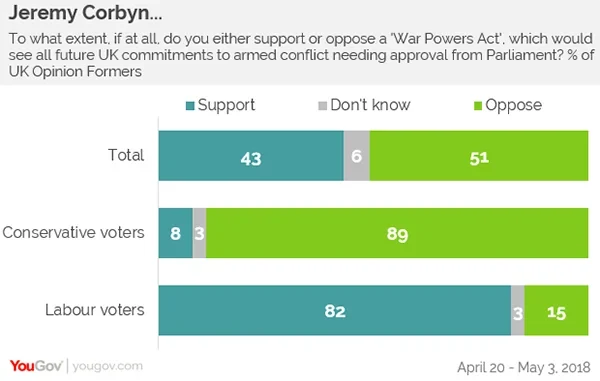In response to the Government’s unilateral decision to participate in air strikes against the Syrian regime alongside the US and France, Opposition leader Jeremy Corbyn called for a new ‘War Powers Act’ which would require any UK military action to be approved by Parliament.
YouGov asked its Opinion Formers panel, which draws together leaders from the worlds of business, politics, the media, charities, public sector and academia among others, whether they thought future UK military action should always be put to the vote.

Given the polarising figure that is Jeremy Corbyn, YouGov decided to ask the question in two separate ways to see if any bias against the Shadow Leader coloured views of the policy. Half of respondents were shown the question with the policy attributed to Corbyn, while the other half saw the question with the policy attributed only to a generic ‘UK politician’.
On face value, attributing the policy either to Jeremy Corbyn personally or a generic ‘UK politician’ makes no difference to whether Opinion Formers supported the idea of a War Powers Act; over half (51%) said they ‘Opposed’ the policy, regardless of how the question was framed. However, dig beneath the surface and analyse respondents via their voting intention and the story takes a turn.

Once Conservative voters knew that it was Jeremy Corbyn’s proposal to institute a War Powers Act, levels of opposition rose ten percentage points from 79% to 89%. Indeed, the story was similar amongst Labour voters, albeit in reverse; when forwarded by a generic ‘UK politician’, 72% of Labour voters expressed support for the policy. When attributed to Corbyn, this too jumped ten percentage points to 82%.
Indeed, for those that might already harbour a bias toward Corbyn, knowledge that any proposal of action emanates from him only appears to harden the opposition against it. Conversely, while it is not clear whether Labour voters in the sample specifically support Corbyn himself, the knowledge that the War Powers Act was Corbyn’s idea only appears to rally support for the policy amongst his most likely supporter base.
While the big picture remains the same, the notable increases amongst both the Conservative and Labour voters certainly are interesting. They say you should judge a plan on its merits, however there is an argument to be made that cult of personality may have more of a sway on how said plan is perceived than you think.
YouGov completed online interviews with 734 opinion formers from its UK Opinion Formers Panel. Opinion Formers are leaders in their field from business, media, politics, NGOs, academia and beyond. Fieldwork was undertaken between 20th April and 3rd May 2018. The figures have not been weighted.
Image Getty






